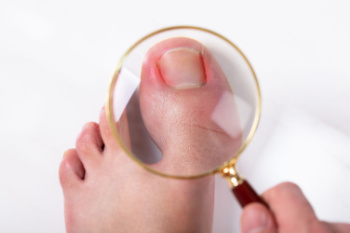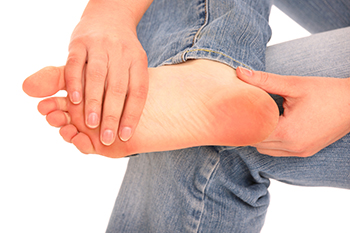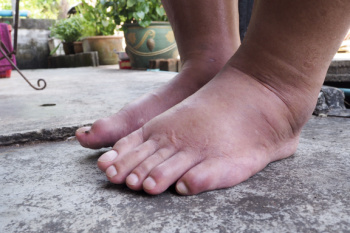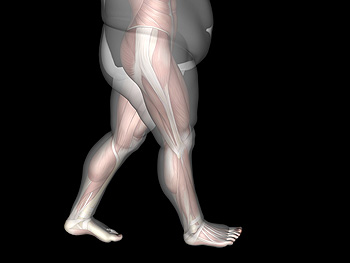Connect With Us
Blog
Items filtered by date: August 2024
Facts About Ingrown Toenails

Ingrown toenails occur when the edges of the toenail grow into the surrounding skin, causing pain and discomfort. This condition typically affects the big toe but can occur on any toe. Symptoms of ingrown toenails include redness, swelling, and tenderness around the affected area, with the potential for infection if left untreated. The primary causes include improper nail trimming, where nails are cut too short or rounded, wearing tight or ill-fitting shoes that press on the toes, and having naturally curved toenails. Other contributing factors can include trauma to the toe or genetic predisposition. To prevent ingrown toenails, it is important to trim nails straight across and wear well-fitting shoes that provide ample space for the toes. If you have symptoms of an ingrown toenail, it is suggested that you consult a podiatrist who can offer you the treatment that is best for you, which may include minor surgery for removal.
Ingrown toenails may initially present themselves as a minor discomfort, but they may progress into an infection in the skin without proper treatment. For more information about ingrown toenails, contact one of our podiatrists of Family Foot and Ankle Care of Moriches. Our doctors can provide the care you need to keep you pain-free and on your feet.
Ingrown Toenails
Ingrown toenails are caused when the corner or side of a toenail grows into the soft flesh surrounding it. They often result in redness, swelling, pain, and in some cases, infection. This condition typically affects the big toe and may recur if it is not treated properly.
Causes
- Improper toenail trimming
- Genetics
- Improper shoe fitting
- Injury from pedicures or nail picking
- Abnormal gait
- Poor hygiene
You are more likely to develop an ingrown toenail if you are obese, have diabetes, arthritis, or have any fungal infection in your nails. Additionally, people who have foot or toe deformities are at a higher risk of developing an ingrown toenail.
Symptoms
Some symptoms of ingrown toenails are redness, swelling, and pain. In rare cases, there may be a yellowish drainage coming from the nail.
Treatment
Ignoring an ingrown toenail can have serious complications. Infections of the nail border can progress to a deeper soft-tissue infection, which can then turn into a bone infection. You should always speak with your podiatrist if you suspect you have an ingrown toenail, especially if you have diabetes or poor circulation.
If you have any questions, please feel free to contact our offices located in Moriches and Shirley, NY . We offer the newest diagnostic and treatment technologies for all your foot care needs.
Gout Pain Can Be Managed
Exercises Can Relieve Pain Under the Feet

If you experience pain under your feet, incorporating specific exercises into your routine can help alleviate it, particularly if you have plantar fasciitis. Stretching and strengthening exercises focus on the plantar fascia, a thick connective tissue in the sole of the foot, and can be done without special equipment. For instance, one exercise involves sitting in a chair, placing the painful foot on your opposite thigh, and pulling your toes towards your shin to stretch the fascia. Another effective exercise requires standing near a wall, raising your toes against it while keeping your heel on the floor, and leaning forward to deepen the stretch. A third exercise involves getting on all fours with toes bent and sliding your bottom back towards your heels to stretch the fascia. While some exercises may cause mild discomfort, they are beneficial once acute pain subsides. A podiatrist can offer specific exercises according to your particular needs. If you have foot pain on the bottom of your feet, it is suggested that you schedule an appointment with a podiatrist for treatment.
Exercising your feet regularly with the proper foot wear is a great way to prevent injuries and build strength. If you have any concerns about your feet, contact one of our podiatrists from Family Foot and Ankle Care of Moriches. Our doctors can provide the care you need to keep you pain-free and on your feet.
Exercise for Your Feet
Exercise for your feet can help you gain strength, mobility and flexibility in your feet. They say that strengthening your feet can be just as rewarding as strengthening another part of the body. Your feet are very important, and we often forget about them in our daily tasks. But it is because of our feet that are we able to get going and do what we need to. For those of us fortunate enough to not have any foot problems, it is an important gesture to take care of them to ensure good health in the long run.
Some foot health exercises can include ankle pumps, tip-toeing, toe rises, lifting off the floor doing reps and sets, and flexing the toes. It is best to speak with Our doctors to determine an appropriate regimen for your needs. Everyone’s needs and bodies are different, and the activities required to maintain strength in the feet vary from individual to individual.
Once you get into a routine of doing regular exercise, you may notice a difference in your feet and how strong they may become.
If you have any questions please feel free to contact our offices located in Moriches and Shirley, NY . We offer the newest diagnostic and treatment technologies for all your foot and ankle needs.
Key Facts About Lipedema and Cankles

Lipedema is a chronic condition characterized by abnormal fat accumulation, typically in the legs and buttocks, which leads to swelling and a disproportionate appearance. This condition often results in a distinctive cankle appearance, where the ankles and calves blend together without a clear definition. Lipedema primarily affects women and can cause discomfort, pain, and increased sensitivity in the affected areas. The exact cause of lipedema is not fully understood but may involve hormonal changes or genetic factors. Managing lipedema often includes lifestyle modifications, such as a balanced diet and regular exercise, and may involve specific medical treatments for relief. If you notice symptoms of lipedema or cankles, it is suggested that you consult a podiatrist who can obtain a proper diagnosis and explore effective treatment options.
Swollen feet can be a sign of an underlying condition. If you have any concerns, contact one of our podiatrists of Family Foot and Ankle Care of Moriches. Our doctors can provide the care you need to keep you pain-free and on your feet.
Swollen feet are a common ailment among pregnant women and people who stand or sit for extended periods. Aging may increase the possibility of swollen feet and patients who are obese often notice when their feet are swelling too. There may be medical reasons why swollen feet occur:
- Phlebitis - A condition that causes the veins to become inflamed and can also cause leg pain.
- Liver disease - This may lead to low blood levels of albumin which is a protein. This can cause fluid in the blood to pass into the tissues and several areas of the body can become swollen.
- Heart failure - When the heart doesn’t pump properly the blood that is normally pumped back to the heart can pool in the veins of the legs causing swollen feet.
- Kidney disease - One of the main functions of the kidneys is releasing excess fluid in the body. This type of condition can make it difficult for the kidneys to function properly, and as a result the feet may become swollen.
- Deep-vein thrombosis (DVT)- This is a serious condition where blood clots form in the veins of the legs. They can block the return of blood from the legs to the heart which may cause the feet to swell. It is important to be treated by a podiatrist if this condition is present.
Swollen feet can also be caused by bone and tendon conditions, including fractures, arthritis, and tendinitis. Additionally, there may be skin and toenail conditions and an infection may cause the feet to swell. Patients who take medicine to treat high blood pressure may be prone to getting swollen feet.
Many patients elevate their feet to help relieve the swelling and this is generally a temporary remedy. When a podiatrist is consulted the reason behind the swelling can be uncovered and subsequently treated.
If you have any questions please feel free to contact our offices located in Moriches and Shirley, NY . We offer the newest diagnostic tools and technology to treat your foot and ankle needs.
Obesity and Foot Pain
 Obesity significantly impacts foot health, often leading to chronic foot pain due to the excessive weight exerting pressure on the feet. This added strain can result in conditions like plantar fasciitis, where the thick band of tissue running across the bottom of the foot becomes inflamed, causing intense heel pain. Additionally, the excess weight can contribute to flat feet, where the arches collapse, leading to further discomfort and instability. To manage foot pain associated with obesity, weight reduction through a balanced diet and regular exercise is important. Low-impact activities like swimming or cycling can help shed pounds without placing additional stress on the feet. Supportive footwear that provides adequate arch support and cushioning is also essential. If you carry excess weight and have persistent foot pain, it is suggested that you seek advice from a podiatrist. This medical professional can offer custom orthotics, recommend specific exercises to strengthen foot muscles, and provide guidance on managing foot health, ultimately enhancing mobility and quality of life.
Obesity significantly impacts foot health, often leading to chronic foot pain due to the excessive weight exerting pressure on the feet. This added strain can result in conditions like plantar fasciitis, where the thick band of tissue running across the bottom of the foot becomes inflamed, causing intense heel pain. Additionally, the excess weight can contribute to flat feet, where the arches collapse, leading to further discomfort and instability. To manage foot pain associated with obesity, weight reduction through a balanced diet and regular exercise is important. Low-impact activities like swimming or cycling can help shed pounds without placing additional stress on the feet. Supportive footwear that provides adequate arch support and cushioning is also essential. If you carry excess weight and have persistent foot pain, it is suggested that you seek advice from a podiatrist. This medical professional can offer custom orthotics, recommend specific exercises to strengthen foot muscles, and provide guidance on managing foot health, ultimately enhancing mobility and quality of life.
Obesity has become very problematic at this point in time and can have extremely negative effects on the feet. If you’re an obese individual and are concerned about your feet, contact one of our podiatrists from Family Foot and Ankle Care of Moriches. Our doctors can provide the care you need to keep you pain-free and on your feet.
Obesity and Your Feet
Since your feet are what support your entire weight when standing, any additional weight can result in pain and swelling. Being overweight is one of the main contributors to foot complications.
Problems & Complications
Extra Weight – Even putting on just a few extra pounds could create serious complications for your feet. As your weight increases, your balance and body will shift, creating new stresses on your feet. This uneven weight distribution can cause pain, even while doing the simplest tasks, such as walking.
Diabetes – People who are overweight are at serious risk of developing type-2 diabetes, which has a drastic impact on the health of your feet. As you get older, your diabetes might worsen, which could lead to loss of feeling in your feet, sores, and bruises. You could also become more prone to various infections.
Plantar fasciitis – Pressure and stress that is placed on muscles, joints, and tendons can trigger plantar fasciitis, which is an inflammation of tissue that forms along the bottom of the foot.
If you have any questions please feel free to contact our offices located in Moriches and Shirley, NY . We offer the newest diagnostic and treatment technologies for all your foot and ankle needs.
Blog Archives
- March 2025
- February 2025
- January 2025
- December 2024
- November 2024
- October 2024
- September 2024
- August 2024
- July 2024
- June 2024
- May 2024
- April 2024
- March 2024
- February 2024
- January 2024
- December 2023
- November 2023
- October 2023
- September 2023
- August 2023
- July 2023
- June 2023
- May 2023
- April 2023
- March 2023
- February 2023
- January 2023
- December 2022
- November 2022
- October 2022
- September 2022
- August 2022
- July 2022
- June 2022
- May 2022
- April 2022
- March 2022
- February 2022
- January 2022
- December 2021
- November 2021
- October 2021
- September 2021
- August 2021
- July 2021
- June 2021
- May 2021
- April 2021
- March 2021
- February 2021
- January 2021
- December 2020
- November 2020
- October 2020
- September 2020
- August 2020
- July 2020
- June 2020
- May 2020
- April 2020
- March 2020
- February 2020
- January 2020
- December 2019
- November 2019
- October 2019
- September 2019
- August 2019
- July 2019
- June 2019
- May 2019
- April 2019
- March 2019
- February 2019
- January 2019
- December 2018
- November 2018
- October 2018
- September 2018
- August 2018
- July 2018
- June 2018
- May 2018
- April 2018
- March 2018
- February 2018
- January 2018
- December 2017
- November 2017
- October 2017
- September 2017
- August 2017
- July 2017
- June 2017
- May 2017
- April 2017
- March 2017
- February 2017
- January 2017
- December 2016
- November 2016
- October 2016
- September 2016
- August 2016
- July 2016
- June 2016
- October 2015
- September 2015
- August 2015
- July 2015
- June 2015
- May 2015
- April 2015




